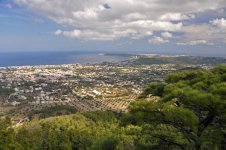Today, I’m excited to share four religious sites that you might want to visit as you journey along a certain road. Each of these destinations offers a unique insight into the spiritual legacy and historical context of the regions you'll find yourself immersed in. However, remember I haven't visited this myself. I am thinking of visiting them. So I will make updates as I find more information. For example, I just added more information about the names of the places so they're easier to find.
1. The Temple at the Crossroads
This serene temple, ancient as the surrounding groves, is named for the cross-section of paths where legend says the gods intersect. The atmosphere is calm, and it's said that prayers offered here meet deities from all four cardinal directions. Locals believe that if you meditate within the temple's main hall, you can sense the divine converging around you.
I think this place is also called Temple of Apollo Pythias but I could be wrong.
2. The Monastery Through the Mist
Nestled high in the mountains, this monastery is famous for the shroud of mist that enwraps it, making it feel like an ethereal resting place. History marks it as the site where the first saint of the region achieved enlightenment. Pilgrims hike hours up treacherous paths to be blessed where the clouds meet the heavens.
I think this place is also called Filerimos Monastery - should be easier to find under this name.
3. The Shrine within a Cave
A cave lodges in a cliffside on the third leg of our journey, housing a shrine illuminated only by the gentle glow of candles. An annual festival invites thousands, as they carry torches along narrow ledges to pay homage to the hermit who first discovered this sanctuary. The echo of religious chants is said to make the rocks themselves vibrate.
I think this is also called Cave of Archangel Michael.
4. The Ancient Blessing Well
A clearing in the dense woods reveals a well, adorned with flowers, that many claim has healing properties. Here, people of all faiths come to draw water and leave tokens of gratitude for the water spirit. This practice was believed to have been started by a traveling monk hundreds of years ago, imparting legends of miraculous recoveries to those who drank from it.
Is this place in the Fortification of Rhodes?
Note: I edited this to fix the error about the amount. I had 5 but decided I didn't want to talk about the fifth. I also put some more information about locations.




